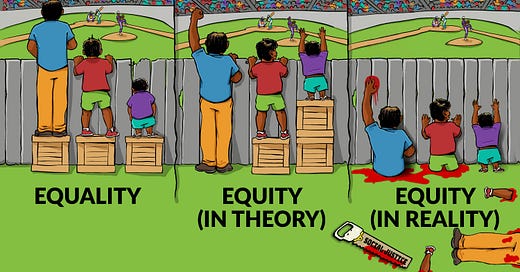When "Equity" Gets It Wrong
In practice, “equity” empowers the incompetent, promotes the incapable, and implements the irrational.
In November 2020, then-VP candidate Kamala Harris posted a video claiming, “Equitable treatment means we all end up at the same place.”
"Equity" is a concept that has often been misinterpreted and misapplied, leading to unintended consequences that undermine the very essence of fairness and meritocracy. In practice, “equity” empowers the incompetent, promotes the incapable, and implements the irrational.
At its core, the pursuit of equity aims to ensure fairness and justice by providing equal opportunities for all individuals. It acknowledges the importance of creating a level playing field where everyone can thrive based on their abilities and efforts. However, the misinterpretation arises when equity is misconstrued as a guarantee that everyone should end up in the same place regardless of their skills, efforts, potential, or even luck.
In practice, “equity” empowers the incompetent, promotes the incapable, and implements the irrational.
Entitlement and Merit
This approach has a significant flaw rooted in the concept of entitlement. When people are taught they deserve results without earning them, it fosters a culture of complacency, reducing motivation for self-improvement. While equal access to opportunities is essential, striving for equal outcomes regardless of individual dedication, skill, and ambition is impractical and hampers progress.
Meritocracy, where success is based on merit, aligns with societal values of equality of opportunity. It reflects the notion that everyone should have a chance to succeed based on their abilities. Whether in education or business, qualifications, experience, soft skills, creativity, and adaptability are crucial in achieving success.
Employment
Businesses exist to make profits, not simply to provide jobs. Individuals are responsible for ensuring they possess the required skills and abilities to be employable. While a job interview presents an opportunity, securing and excelling in the job depends mainly on an individual's actions and capabilities. Being employable is not just about finding a job but also about adapting, learning continuously, and adjusting to the changing demands of the job market.
The idea that most employees could seamlessly transition into a managerial or CEO position if they were only “lucky enough” overlooks the reality that such roles demand a distinct skill set, experience, and leadership qualities that only some possess. The bottom line is that most employees could never be a successful manager, let alone a CEO.
Education
Elevating the most qualified and capable students makes the world better. The best and brightest among us should be amplified and encouraged to contribute by utilizing their skills and knowledge to drive innovation, provide valuable services, and/or contribute to societal development. Providing gifted students opportunities for greater academic rigor (honors, AP, etc.) is common sense.
Culture
The assertion that all cultures are equal disregards the impact of cultural norms on various aspects of life, including education, work ethic, and societal values. Different cultures have strengths and weaknesses, and ignoring these distinctions can hinder progress by overlooking valuable insights and approaches.
While it may be politically incorrect to point it out, some cultures are better than others. Not all beliefs are equally valid.
Fairness
Excellence, ambition, and merit should be celebrated and rewarded rather than dismissed or downplayed as mere luck. Encouraging individuals to strive for greatness while rewarding their accomplishments fosters a culture of innovation, hard work, and continuous improvement. Any society should want that.
While acknowledging that luck may play a role in certain circumstances, it should never overshadow the importance of effort and competence in achieving success. Much of the “equity” commentary appears to be envy disguised in calls for “fairness.”
The focus on "equity" seems driven by envy, even when presented as calls for fairness. Envy is a feeling of resentment towards someone who has something that you don't have. It is often accompanied by a desire to take away what the other person has rather than work to acquire it for oneself. On the other hand, fairness involves treating everyone equally, regardless of their circumstances or possessions. It means giving everyone an equal opportunity to succeed rather than punishing or taking away from someone who has achieved success.
Pursuing equity should not be misconstrued as guaranteeing equal outcomes, as it undermines the essence of meritocracy. Fairness lies in aspiring to provide equal opportunities and acknowledging the inherent differences among individuals while rewarding excellence and ambition. Striking a balance between opportunity and recognizing individual merit is crucial to fostering a fair and just society.
The idea that everyone possesses the same potential is a myth. Many variables, including innate abilities, personal circumstances, and upbringing, contribute to the vast differences in people's capabilities. It's essential to recognize that individuals have different skills, levels of intelligence, and work ethic. Fairness always demands responsibility and accountability. Striving for equal outcomes is not only unrealistic but also unjust.





